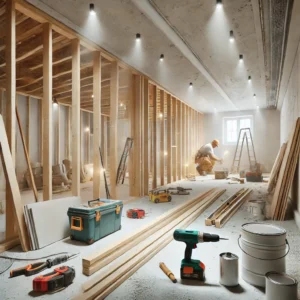
Finding renovation contractors can be a daunting task, especially for those who want quality work without the hassle. Local renovation contractors bring expertise and a strong understanding of regional building codes, ensuring that projects comply with regulations while also meeting client expectations. Their familiarity with local suppliers can often translate to better material access and cost efficiency.
Potential clients should consider factors like reviews, portfolios, and initial consultations when searching for local contractors. These elements can help gauge the contractor’s competence and reliability before making a commitment. A well-chosen contractor can transform a home, adding value and enhancing comfort through thoughtful renovations.
By searching for “renovation contractors near me,” individuals can uncover trusted professionals with proven track records in their area. This targeted approach not only saves time but also connects homeowners with experts who understand their community’s unique needs and styles, making the renovation process smoother.
Finding the Right Contractor
Choosing the right renovation contractor involves careful consideration of their qualifications, local regulations, and previous work. Scrutinizing these aspects ensures a smooth renovation process.
Verifying Credentials and Experience
It is essential to verify the credentials and experience of a renovation contractor. Start by checking their licensing status, which varies by state or country. A licensed contractor demonstrates adherence to industry standards.
Ask for proof of insurance, including liability and worker’s compensation. This protects homeowners from financial liability in case of accidents. Additionally, review the contractor’s experience in specific renovation types, such as kitchens or bathrooms.
Getting references from previous clients can provide insights into their reliability and work ethic. Contacting these references helps gauge satisfaction levels and overall project success.
Understanding Local Licensing Requirements
Understanding local licensing requirements is crucial before hiring a contractor. Each region has its regulations governing building and renovation work. Homeowners should familiarize themselves with these rules.
Licenses ensure that contractors are qualified to perform renovations safely. Failure to hire a licensed contractor can lead to costly fines or project delays.
Homeowners can often check licensing through local government websites. Some regions also provide information on verified complaints or disciplinary actions. This helps in making a more informed decision.
Assessing Portfolio and Past Projects
Reviewing a contractor’s portfolio and past projects offers valuable insight into their capabilities. A well-maintained portfolio showcases a variety of completed renovations, illustrating their breadth of experience.
Look for projects similar in scope and style to the intended renovation. This helps in assessing their aesthetic and technical competencies.
In addition to the portfolio, ask for before-and-after photos and any relevant case studies. These elements can reveal the contractor’s design sensibility and attention to detail. Speaking with past clients about their experiences can further clarify how the contractor communicates and oversees projects.
Preparing for Renovation
Preparation is essential for a successful renovation. Proper planning affects budgeting, design, and contractual agreements, ensuring a smoother process.
Setting a Realistic Budget
Creating a budget should be the first step in the renovation process. Homeowners need to assess their finances to determine how much they can afford to spend.
Key budget components include:
- Labor costs: Estimate based on contractor quotes.
- Materials: Factor in quality and quantity.
- Contingency fund: Set aside 10-20% for unexpected expenses.
Researching local market rates can provide a clearer picture. Detailed budgeting helps avoid financial strain later. Regularly reviewing and adjusting the budget during the project is also advisable.
Designing Your Space
Effective design hinges on functionality and aesthetics. Homeowners should consider their lifestyle and how the space will be used.
Choosing a design style can streamline decisions. Options might include:
- Modern: Sleek lines and minimalism.
- Traditional: Classic features with warmth.
- Industrial: Raw materials and urban vibes.
Using mood boards or design software helps visualize ideas. Collaborating with a designer can enhance creativity while ensuring practical implementation. Considerations like lighting, color schemes, and layout must also align with budgetary constraints.
Navigating Contracts and Agreements
Understanding contracts is crucial to protect the homeowner’s investment. A well-drafted agreement outlines the project scope, budget, and deadlines.
Key elements of a renovation contract include:
- Scope of work: Detailed description of tasks.
- Payment schedule: Clear terms for payment timelines.
- Permits and inspections: Responsibility for obtaining necessary approvals.
Homeowners should ask questions and request clarification on any unclear terms. It’s also wise to read reviews and check the contractor’s references. This diligence helps establish trust and ensures alignment between expectations and deliverables.
Vaishno Devi VIP Darshan Ticket Price: An Overview for Pilgrims
When planning a pilgrimage to Vaishno Devi, many visitors seek information on the VIP dars…